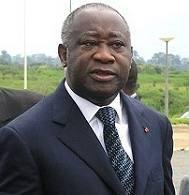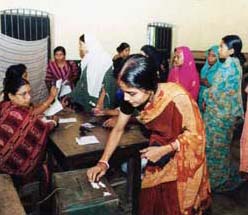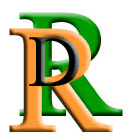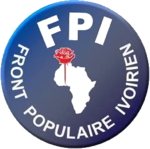
The Politics of Ivory Coast takes place in a framework of a presidential representative democratic republic, whereby the President of Ivory Coast is both head of state and head of government, and of a multi-party system. Executive power is exercised by the President and the Government. Legislative power is vested in both the government and parliament.

Koudou Laurent Gbagbo is an Ivorian politician who was the President of Côte d'Ivoire from 2000 until his arrest in April 2011. A historian, Gbagbo was imprisoned in the early 1970s and again in the early 1990s, and he lived in exile in France during much of the 1980s as a result of his union activism. Gbagbo founded the Ivorian Popular Front (FPI) in 1982 and ran unsuccessfully for president against Félix Houphouët-Boigny at the start of multi-party politics in 1990. He won a seat in the National Assembly of Côte d'Ivoire in 1990.

The Ivorian Party of Workers is a centre-left, democratic socialist and social democratic, political party in Ivory Coast. It is led by Francis Wodié and was founded on April 8, 1990.

Elections in Bangladesh gives information on election and election results in Bangladesh.

Côte d'Ivoire elects on national level a head of state - the president - and a legislature. The president is elected for a five-year term by the people. The National Assembly has 225 members, elected for a five-year term in single-seat constituencies. Côte d'Ivoire is a one party dominant state with the Ivorian People's Front in power. Opposition parties are allowed, but are widely considered to have no real chance of gaining power. Following a peace deal between the government and former rebels in March 2007, the next elections were planned for early 2008. These elections however, were postponed to November 2009 first, and then to early 2010.

Elections in Kuwait are held for both the National Assembly and for the Municipality. Kuwait's constitution calls for elections to the unicameral National Assembly at a maximum interval of four years. Elections are held earlier if the Constitutional Court or Emir dissolve the parliament.

Romain Francis Wodié is an Ivorian politician. A professor and human rights activist, he led the Ivorian Workers' Party (PIT) from 1990 to 2011. During that time, Wodié served as a Deputy in the National Assembly of Côte d'Ivoire from 1990 to 1995 and as Minister of Higher Education from 1998 to 1999. He was President of the Constitutional Council of Côte d'Ivoire from 2011 to 2015.

Guillaume Kigbafori Soro is an Ivorian politician who was the Prime Minister of Côte d'Ivoire from April 2007 to March 2012. Prior to his service as Prime Minister, Soro led the Patriotic Movement of Côte d'Ivoire, and later the New Forces as its Secretary-General. Since March 2012, Soro has been President of the National Assembly of Côte d'Ivoire.

The National Assembly is lower house of the Parliament of Ivory Coast since November 2016. From 1960 to 2016, The National Assembly was Ivory Coast's unicameral legislative body. Evolved from semi-representative bodies of the French Colonial period, the first National Assembly was constituted on 27 November 1960 with 70 elected members (députés) in accordance with the Constitution of 31 October 1960, which created the First Republic.

A parliamentary election was held in Ivory Coast on 11 December 2011, after the presidential election which was held in late 2010. This followed a peace agreement between the government and the New Forces that was signed in March 2007. The Rally of the Republicans, the party of President Alassane Ouattara, won just under half the seats in the National Assembly.

Presidential elections were held in Ivory Coast on 22 October 2000. Robert Guéï, who headed a transitional military regime following the December 1999 coup d'état, stood as a candidate in the election. All of the major opposition candidates except for Laurent Gbagbo of the Ivorian Popular Front (FPI) were barred from standing. The Rally of the Republicans (RDR) and Democratic Party of Côte d'Ivoire – African Democratic Rally (PDCI-RCA) boycotted the election in response to the exclusion of their candidates by the Supreme Court.
The 1999 Ivorian coup d'état took place on December 24, 1999. It was the first coup d'état since the independence of Ivory Coast and led to the President Henri Konan Bédié being deposed.

Presidential elections were held in Ivory Coast on 22 October 1995. They were boycotted by the main opposition parties, the Ivorian Popular Front and the Rally of the Republicans, in protest of new electoral rules that the opposition deemed unfair. Presidential candidates were required to have been born of two Ivorian parents, and to have been resident in the country for the previous five years. These provisions appeared to have been aimed at the RDR's intended candidate, former Prime Minister Alassane Ouattara. He had been in the United States since 1990 while working for the International Monetary Fund, and there had been longstanding rumors that his father had been born in Burkina Faso.

Parliamentary elections were held in Ivory Coast on 25 November 1990, the first since the restoration of multi-party democracy earlier in the year. Although 17 of the 25 legalised parties ran in the election, nearly half of the 490 candidates were from the former sole legal party, the Democratic Party of Côte d'Ivoire – African Democratic Rally (PDCI). The PDCI won a landslide victory, taking 163 of 175 seats on 71.7 percent of the vote. Only two other parties got into the legislature, winning just 12 seats between them. Voter turnout was reported to be around 40%.

Early general elections were held in Kuwait on 27 July 2013. The elections were required after the Constitutional Court dissolved Parliament and annulled the results of the December 2012 elections. Voter turnout was an estimated 52.5%, which was higher than expected despite an opposition boycott, and only 7% lower than the non-boycotted February 2012 elections.

Presidential elections were held in Ivory Coast on 25 October 2015. Alassane Ouattara won a second term in a landslide victory over his closest rival Pascal Affi N'Guessan.

The Rally of Houphouëtists for Democracy and Peace is a political alliance in Ivory Coast.

A constitutional referendum was held in Ivory Coast on 30 October 2016. Voters were asked whether they approve of a proposed new constitution. The new constitution would create a Senate, remove the nationality clause from the presidential requirements and establish the post of Vice-President. The constitution was approved by 93.42% of votes with a 42.42% turnout, as announced by the president of the Independent Electoral Commission (CEI).














